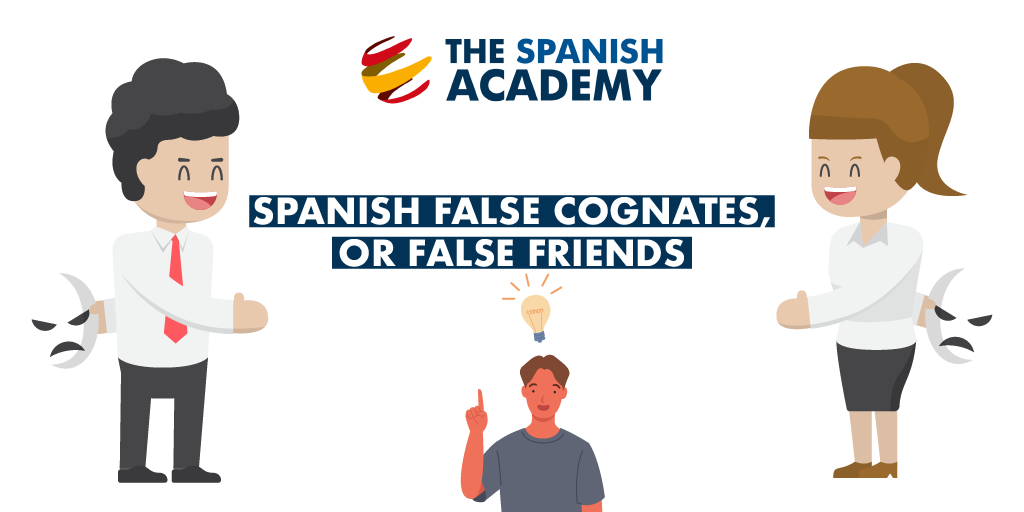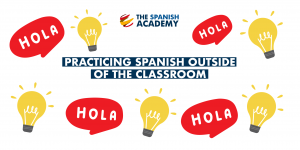What are cognates?
Spanish false cognates and cognates are different. Cognates are words that have a common etymological origin. Cognates are often inherited from a shared parent language. Also, they can be borrowings from other language.
English to Spanish cognates sound the same. And they also mean the same. So they are very useful words to incorporate in your learning as sooner or later you will be able to use them effortlessly. But not all the words which sound the same mean the same!
There are plenty of false cognates or false friends. False cognates are words that are spelt the same or similar but have completely different meanings.
Since our teachers regularly come through during our online Spanish lessons, we have decided to put some of them together for you. We believe they will be very useful whenever you decide to travel to Spain and practice all you have learnt.
Find below a list of the most commonly used English to Spanish false cognates:
Common Spanish false cognates you should remember!
1. Embarazada.
This is probably the most popular false friend of all. And you may feel “desconcertada” but not “embarazada” when using it wrong, 🤓.
Our Spanish students always show a surprise face when they know the real meaning of “embarazada”. Especially when a male student claims to be “embarazado” in our Spanish lessons, 🤣.
Teachers and students instantly connect during their Spanish free trial when students confess how “embarazados” they feel with their mistakes, 🤪. You should book your free trial and experience it!
❌ It sounds like: Embarrassed.
✅ It means: Pregnant.

2. Molestar.
You may hear Spanish couples or friends shouting “¡No me molestes más!” at each other. And you will realise there is no sexual harassment involved, right? They are just arguing.
Or perhaps your Spanish teacher explains that his dog “le molesta siempre durante la siesta”, and you shouldn’t picture his dog involved in molesting activities, 🙄. The dog is just annoying your Spanish teacher, 🙂.
❌ It sounds like: Molest.
✅ It means: Annoy.

3. Fábrica.
A classic false friend our Spanish for business students always come through. When our students are looking for the best fabrics to produce shirts, they realise it is not too practical to make them out of soft “fábricas”, 🙄. Instead, they should choose soft “telas”, 😅.
❌ It sounds like: Fabric.
✅ It means: Factory.

4. Pie.
A very funny one! And our Spanish for kids lessons are filled with laughter when they come across learning the human body in Spanish.
No! Humans don’t have pies at the end of their legs! Indeed they do have “pies”, but not “pasteles” (which is the Spanish translation of “pies”), 🤯.
❌ It sounds like: Pie.
✅ It means: Foot.

5. Introducir.
When students come to their first lessons and they meet their classmates, they introduce themselves, they do not insert themselves. It is very confusing to Spanish learners realising that inserting an object somewhere sounds like introducing it, 🤣
❌ It sounds like: Introduce.
✅ It means: Insert.

6. Realizar.
“¿Has realizado los deberes?” is a question your Spanish teacher will ask you many times. He is not asking if you realised you didn’t do your homework once again, 🤣. Instead, you should remember we use “realizar” as a synonym of “hacer” o “llevar a cabo”.
❌ It sounds like: Realise.
✅ It means: Carry out/Do.

7. Asistir.
A very confusing false cognate. Although you may assist your colleague during a meeting, you first need to attend the meeting.
If you confirm you are joining a Spanish party, you won’t let your guest know you will assist him. Your guest only wants to know if you are attending it, 🥳
❌ It sounds like: Assist.
✅ It means: Attend.

8. Contestar.
Our kids students love participating in Spanish-speaking contests. They do not contest the questions, but they reply to the jury. They participate in contests, where they have to “contestar” in order to be the best.
❌ It sounds like: Contest.
✅ It means: Reply.

9. Preservativo.
This one is by far the most embarrassing false cognate (not pregnant!)!
Can you imagine your English friend reviewing your favourite tapas place: “La comida estaba muy buena, pero algunas tapas llevaban demasiados preservativos.” (Food was very good, but some tapas had too many condoms.) 😲
❌ It sounds like: Preservative.
✅ It means: Condom.

10. Constipado.
Imagine the reaction of our students when their teachers is on leave because “está constipado”, 😆.
You would definitely wonder what being constipated has to do with being unable to teach, right…?
❌ It sounds like: Constipated.
✅ It means: Cold.

Besides the list we prepared, we are sure you have come across other Spanish false cognates that caught your attention, right?
Drop us a message via Facebook or Instagram and we will be happy to share it with all of our beloved students and followers, 🥰
Don’t forget to …




